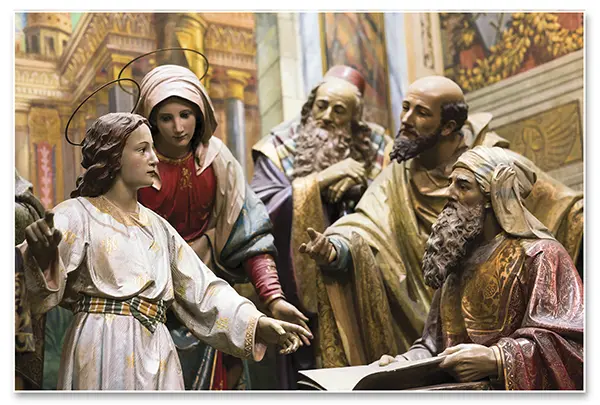Let us imagine that we have managed to climb the face of a mountain until reaching its summit, where we find an enormous nest with an eagle’s nestling. Concealed behind a rock, we soon see the eagle returning to the nest from the hunt. In its claws is a quarry that it has brought to feed its young, which, not yet ready to fly, cannot stray from the nest or it will fall into the precipice.
At a certain point, however, the wings of the eaglet begin to develop. What does the eagle do? How does she train her fledgling? First she sets it on her back, grasped firmly onto her feathers, so that it can get a taste for the wind; then, she takes it in her own claws, lifts it up half a metre above the nest and drops it.
Feeling itself alone in the air, the eaglet, terrified, beats its wings clumsily, makes an effort, and falls into the nest. After several repetitions, the mother instinctively perceives that it is no longer dependent. Then, she takes it to a distant place and… releases it. When at last the young eaglet takes wing in its first flight and soars across the blue expanse, the mother eagle, if she could think, might say: “Mission accomplished: another eagle in the sky!”
“Will you be the son I have in the depths of my soul?”
This in fact is what Dona Lucilia did with Dr. Plinio: having been called to protect, develop, and even to enrich his innocence, bringing him to his plenitude as the eagle did the eaglet, she supported, educated, encouraged and helped him until she perceived him to be entirely master of his own actions. Only then was her mind at ease as to his formation, but not as to vigilance, for she still kept out a watchful eye: “What direction is he taking? Where is he headed?”
She manifested her expectations not only through her reprimands, but also by the way she treated him, which he would later define as “a contemplative solicitude,” imbued with the following sentiment:
“‘This is my son. I have reason to hope that he will turn out to be certain ways and certain other ways… I will play with him, surrounding him with my affection, protecting him and seeking in him the preliminary signs of my hope. To what extent will it be realized?’ I felt myself spurred on by a hopeful enquiry, as from one who asked lovingly: ‘My son, will you be who I have in the depths of my soul?’”
On another occasion, Dr. Plinio recalled: “Whatever she demanded of me was because the Law of God demanded it, and because God most high, most wise and most good would want things to be done in that manner. She wished for me to be as I should, not so that I might be a practical and useful son for her, but rather with the idea of having a son who would offer to God a sacrifice as it should be offered to Him.”
She preferred to see him dead than gone astray
Although neither Dona Lucilia nor Dr. Plinio ever said as much to the author, it is clear that underlying her vigilance was not only the desire that he excel, but also the fear that her son, with the intelligence, aptitudes and distinction that were natural to him, would at some point become attracted to a career or to worldliness which would be the ruin of his virtue.
An upright and innocent soul, Dona Lucilia possessed a clear understanding of the damage done to humanity by original sin, and it pained her greatly to see any lack of fidelity. It was the internal struggle of her life, along with the notions gained from what she had heard of numerous cases in society. This is why she feared that someone would exert a noxious influence on the boy, and she sought to protect his innocence to the utmost. She would pray a great deal for him, begging the Sacred Heart of Jesus to deliver him from the paths of evil. Dr. Plinio’s words confirm this:
“She had been a most solicitous mother regarding my health, but several times when I was a young boy, at the time when the character is in formation, she would say to me with great tenderness: ‘I would rather see you dead than gone astray.’ It was as much as to say: ‘The times are bad and you are still quite young; nobody knows what a person is capable of when he is lost.’ […] She would have given her life to prevent my death! But she would have preferred my death to seeing me in a state of mortal sin or of rupture with the Church.”
Beseeching graces for her son’s perseverance
What strength was not added to the foundation of his faith and perseverance by the prayers of Dona Lucilia? One fact, which occurred repeatedly during Plinio’s adolescence, permits us to affirm it with confidence: every time she entered the Shrine of the Sacred Heart of Jesus, close to her house, she went to pray in front of a beautiful set of sculptures representing the Child Jesus in the Temple debating with the doctors, flanked by Our Lady and St. Joseph. What did she request there?

The finding of the Child Jesus among the Doctors of the Law – Sacred Heart of Jesus Shrine, São Paulo
Dona Lucilia never explained to him why she lingered before those statues; but, through discernment of spirits, looking into the depths of his mother’s soul, Plinio understood that she was praying for him! Indeed, at home, Dona Lucilia witnessed him as a young boy discussing religious themes with his cousins and uncles, so she asked special graces and gifts from the Holy Spirit for her son so that he might acquire the spirit of argumentation and of wisdom from Our Lord and emerge victorious in every dispute, whether with his family members or with his adversaries.
And that which she as his mother requested was granted! At a certain moment, owing to those intense prayers of Dona Lucilia, he must have received an infusion of operative graces which allowed him a share of the spirit of the combativeness of the Divine Redeemer, so as to become extremely upright, an invincible fighter against evil and a tireless propagator of the good.
Like a soothing and fragrant balm
It cannot be imagined how much Dona Lucilia prayed for Dr. Plinio… Always with much gentleness and respect. Years later, as an adult, on several occasions he would see her enter the room and draw close to him just as he was about to fall sleep. Amidst the drowsiness that overcame him, he would notice that she was praying, beseeching Our Lady’s support and help for him. Several decades later, Dr. Plinio would remember how this daily encounter would end:
“After I had already fallen asleep, I would awake to her caressing me and making the sign of the Cross on my forehead before going to bed. I perceived something of her lofty spiritual purview flowing over me like a soothing and fragrant balm, which anointed me and did me good, soaking into me as oil into paper.”
Following this, at times, she herself would turn off the bedside lamp, leave the room, and he would sleep remembering her physiognomy. ◊
Taken, with slight adaptations, from:
CLÁ DIAS, EP, João Scognamiglio.
O dom de sabedoria na mente, vida e obra de
[The Gift of Wisdom in the Mind, Life and Work of]
Plinio Corrêa de Oliveira.
Città del Vaticano-São Paulo: LEV;
Lumen Sapientiæ, 2016, v.I, p.146-152


